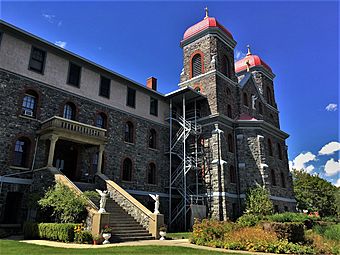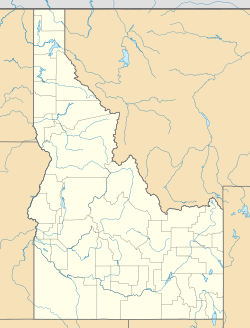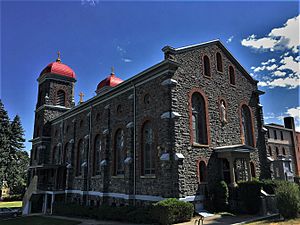St. Gertrude's Convent and Chapel facts for kids
Quick facts for kids |
|
|
Monastery of St. Gertrude
|
|
 |
|
| Location | West of Cottonwood, Idaho |
|---|---|
| Area | less than one acre |
| Built | 1919 |
| Architect | Englebert Gier |
| Architectural style | Romanesque |
| NRHP reference No. | 79000790 |
| Added to NRHP | June 18, 1979 |
The Monastery of Saint Gertrude is a special home for Benedictine nuns near Cottonwood, Idaho. Nuns are women who dedicate their lives to God and live in a community. This monastery was started by three nuns from Switzerland who came to the United States in 1882. It became the main home for their community in 1909. The main building and its chapel are so important that they were added to the National Register of Historic Places in 1979.
Contents
The Story of Saint Gertrude's Monastery
The story of this community began with Mother Johanna Zumstein, Sister Magdalene Suter, and Sister Rosalia Ruebli. They left Sarnen, Switzerland, on September 26, 1882. After a long journey, they arrived in Gervais, Oregon.
Early Days and New Schools
These brave nuns started new convents and schools. They opened places in Uniontown and Colton, Washington. They also taught in schools in Cottonwood and Genesee, Idaho. The sisters helped with other important missions in eastern Washington and northern Idaho.
Moving to Cottonwood
In 1909, a man named John Uhlenkott invited the sisters to move to Cottonwood. His two daughters had joined the convent. He gave them 10 acres of land on a hill overlooking the town. This land was perfect for building a new school and home.
Building the Monastery
The nuns hired Jakob Engelbert Gier to design their new chapel and convent. Gier was a German immigrant from Mt. Angel, Oregon. He had designed other important buildings, like St. Mary's Church in Mount Angel.
Construction started in 1919 and finished in 1924. After World War I, there were not many workers available. So, some of the nuns helped quarry the stone. They even helped move the heavy stones to the building site!
A Century of Service
For the next 50 years, the community continued to run schools across Idaho. This included St. Gertrude's Academy in Cottonwood, which closed in 1970. Today, the former campus is home to Prairie Junior/Senior High School. The community celebrated its 100th anniversary in 2009.
Amazing Architecture
The historic building has two main parts. There is a chapel that is about 50 feet wide and 127 feet long. The convent wing, where the nuns live, is about 127 feet by 164 feet.
Chapel Towers and Design
The chapel has two tall corner towers, each 97 feet high. These towers have special roofs made of red shingle tiles and are topped with gold crosses. Inside the towers are bells that honor the Sacred Heart and saints like Joseph, Michael (archangel), and Gabriel. A statue of the Sacred Heart of Jesus stands in a special spot between the towers.
Strong Stone Walls
The walls of the monastery are two feet thick! They are made from a local blue stone called quartz-porphyry. This stone gives the building its strong, classic look, typical of the Romanesque Revival style. The building sits on a stone foundation, with a grand staircase leading to the front entrance. This makes it look very grand and impressive.
The chapel's long sides have seven sections, each supported by strong stone supports called buttresses. Each section has a two-story arched window and an oval window above it. These windows are framed with bricks made right there in the area. A statue of Saint Gertrude of Helfta is in a niche above the chapel's back entrance. The monastery is named after her.
Beautiful Interior Details
The inside of the chapel is very richly decorated with pieces carved by hand. The main altar, a gift from one of the founding sisters' brothers, was built in 1928 in Sigmaringen, Germany. It was made by a company famous for its religious art.
The side shrines were saved from the original wooden building. They were bought in 1909 from a company in Dubuque, Iowa. In 1947, Alex Linenberger and Associates painted the beautiful emblems of the Apostles' Creed and other pictures on the chapel's ceilings and walls.




